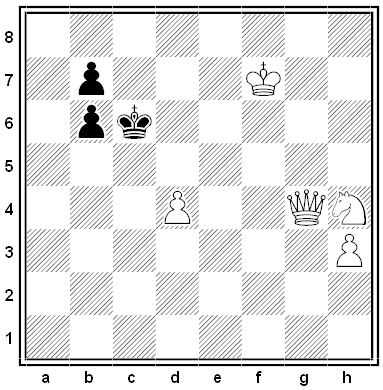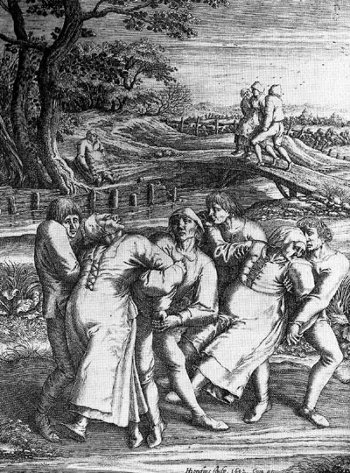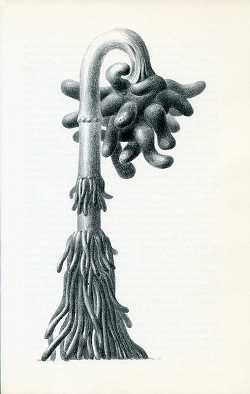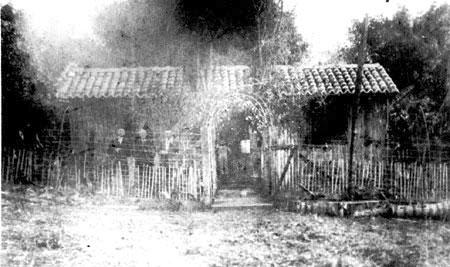
A cylindrical problem by Miodrag Petkovic: Imagine that the board is rolled into a cylinder, with the a-file adjoining the h-file. How can White mate in two moves?

A cylindrical problem by Miodrag Petkovic: Imagine that the board is rolled into a cylinder, with the a-file adjoining the h-file. How can White mate in two moves?
In 1961, Robert Rauschenberg was invited to participate in a Paris show in which artists were to exhibit a portrait of gallery owner Iris Clert. Rauschenberg sent a telegram:
THIS IS A PORTRAIT OF IRIS CLERT IF I SAY SO
Was he right? Perhaps so: Three years later, Parisian performance artist Ben Vautier sat down in a street in Nice holding a placard in his lap. The placard read:
Regardez moi cela suffit je suis art.
That means, “Look at me. That’s all it takes; I’m art.”
In 1975 Denys Parsons devised a surprisingly simple way for nonmusicians to record melodies — write an asterisk for the first note, then hum the tune and decide whether each subsequent note goes up (U), down (D), or repeats (R). The first two phrases of “Happy Birthday,” for instance, look like this:
*RUDUDDRUDUD
(“* repeat up down up down down repeat up down up down”)
This is surprisingly effective — Parsons, who spent five years indexing practically every well-known classical theme from the 16th century onward, wrote, “I continue to be astonished that such a simple test, taken to the sixteenth note (or less), should be adequate to distinguish more than 10,000 classical themes.” Can you identify the eight famous classical melodies below?
imbonity
n. the reverse of goodness; unkindness
nocument
n. harm, damage; evil
impenitible
adj. incapable of repentance
illachrymable
adj. incapable of weeping

Only the brilliantly inventive Lee Sallows would think of this. The figure above combines Penrose triangles with Borromean rings: Each of the triangles is an impossible object, and they’re united in a perplexing way — although the three are linked together, no two are linked.
(Thanks, Lee.)

In July 1518, a woman named Frau Troffea stepped into a street in Strasbourg and began to dance. As onlookers gathered it became clear that she could not stop; after many hours of exertion she collapsed and slept briefly but then rose and again began the dance. After three exhausting days she was bundled into a wagon and taken to a shrine in the Vosges Mountains, but her example had had its effect. Within days more than 30 more people had begun to dance uncontrollably, and their numbers grew; according to one chronicle, within a month 400 people were dancing.
The fact of the plague is well attested; a manuscript chronicle in the city’s archives reads:
There’s been a strange epidemic lately
Going amongst the folk,
So that many in their madness
Began dancing,
Which they kept up day and night,
Without interruption,
Until they fell unconscious.
Many have died of it.
The sickness lasted until early September, when it passed away just as mysteriously. A number of explanations have been put forward, including convulsion brought on by ergot, a mold that flourishes on the stalks of damp rye. The most convincing was advanced by John Waller in his 2008 book A Time to Dance, A Time to Die: He found that a series of famines had preceded the dancing plague, spreading fear and anxiety through the city, and that a Christian church legend had told that a wrathful Saint Vitus would send down plagues of compulsive dancing on anyone who angered him. The dancing, Waller believes, was a “mass psychogenic illness” brought on by this belief.
Vanderbilt epidemiologist Timothy Jones says the plague is “of immense historical value”; it “tells us much about the extraordinary supernaturalism of late medieval people, but it also reveals the extremes to which fear and irrationality can lead us.”

Dutch author Leo Lionni devoted most of his career to children’s books, but in 1977 he undertook a weird experiment. Parallel Botany is a catalog of made-up plants, whose made-up features are described by made-up botanists and illustrated by Lionni’s pencil drawings. Sigurya barbulata, at left, is distinguished by its crowning “cephalocarpus”; a specimen discovered in a Mexican pyramid was found to have been metallized into an organic mace, but how this had come about is the subject of “furious debates.”
“The difficulties of applying traditional methods of research to the study of parallel botany stem chiefly from the matterlessness of the plants,” Lionni wrote. “Deprived as they are of any real organs or tissues, their character would be completely indefinable if it were not for the fact that parallel botany is nonetheless botany, and as such it reflects, even if somewhat distantly, many of the most evident features of normal plants.”
Why do all this? Lionni closes with a quote by the made-up Swedish philosopher Erud Kronengaard: “There are two kinds of men, those who are capable of wonder and those who are not. I hope to God that it is the first who will forge our destiny.”
The 1850s saw a strange experiment in the American West: The U.S. Army imported 70 camels for help in managing the country’s suddenly enormous hinterland. In this week’s episode of the Futility Closet podcast we’ll see how the animals acquitted themselves in an unfamiliar land under inexperienced human masters.
We’ll also learn a surprising theory regarding the origin of zebra stripes; follow the further adventures of self-mailing ex-slave Henry “Box” Brown; ask whether a well-wrought piano can survive duty as a beehive, chicken incubator, and meat safe; and present the next Futility Closet Challenge.
“Via ovicapitum dura est. The way of the egghead is hard.” — Adlai Stevenson

When the Civil War ended, thousands of Confederates chose to leave the United States entirely and settle in Brazil. “Shall any Southerner be blamed, if he seeks a land where the night of vengeance has not come, that his day may not be one of threatening?” asked Ballard S. Dunn in Brazil, the Home for Southerners (1866). “Why should he? For, as surely as that these four years of disastrous war have left most of those who have been true to themselves and their ancestors penniless, homeless, despoiled, and bereaved, so surely the future, with its cumbrous disabilities, and fearful forebodings, promises nothing better than poverty and humiliation.”
About 10,000 Southerners made the trip to Brazil, where most settled in the state of São Paulo. Today their descendants form an ethic subgroup. In the city of Americana, the 300-member Fraternity of American Descendants holds an annual festival with Confederate flags, uniforms, and music, and a local cemetery holds the remains of W.S. Wise, the great-uncle of former First Lady Rosalynn Carter.